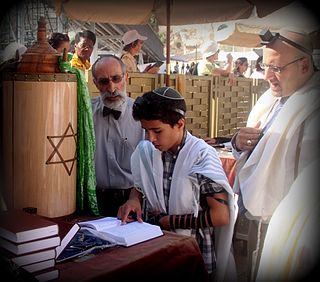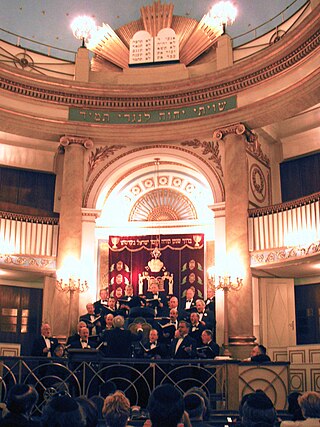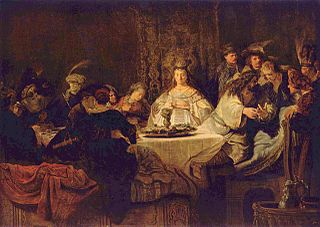Related Research Articles
Christianity began as a movement within Second Temple Judaism, but the two religions gradually diverged over the first few centuries of the Christian Era. Today, differences of opinion vary between denominations in both religions, but the most important distinction is Christian acceptance and Jewish non-acceptance of Jesus as the Messiah prophesied in the Hebrew Bible and Jewish tradition. Early Christianity distinguished itself by determining that observance of halakha was not necessary for non-Jewish converts to Christianity. Another major difference is the two religions' conceptions of God. The Christian God consists of three persons of one essence, with the doctrine of the incarnation of the Son in Jesus being of special importance. Judaism emphasizes the Oneness of God and rejects the Christian concept of God in human form. While Christianity recognizes the Hebrew Bible as part of its scriptural canon, Judaism does not recognize the Christian New Testament.

Judaism is an Abrahamic, monotheistic, and ethnic religion. It comprises the collective spiritual, cultural, and legal traditions of the Jewish people, having originated as an organized religion in the Middle East during the Bronze Age. Contemporary Judaism evolved from Yahwism, the cultic religious movement of ancient Israel and Judah, around the 6th/5th century BCE, and is thus considered to be one of the oldest monotheistic religions. Religious Jews regard Judaism as their means of observing the Mosaic covenant, which was established between God and the Israelites, their ancestors. Jewish religious doctrine encompasses a wide body of texts, practices, theological positions, and forms of organization.

Marriage in Judaism is the documentation of a contract between a Jewish man and a Jewish woman in which God is involved. In Judaism, a marriage can end either because of a divorce document given by the man to his wife, or by the death of either party. Certain details, primarily as protections for the wife, were added in Talmudic times.

Reform Judaism, also known as Liberal Judaism or Progressive Judaism, is a Jewish denomination that emphasizes the evolving nature of Judaism, the superiority of its ethical aspects to its ceremonial ones, and belief in a continuous search for truth and knowledge, which is closely intertwined with human reason and not limited to the theophany at Mount Sinai. A highly liberal strand of Judaism, it is characterized by lessened stress on ritual and personal observance, regarding halakha as non-binding and the individual Jew as autonomous, and great openness to external influences and progressive values. The fundamental difference is the approach to Torah and the implications of that approach. The Orthodox believe that it comes directly from God and so cannot be changed. Since its founding in Germany in the 1800s, Reform Judaism has adapted prayer liturgy into a more flexible understanding of Judaism.

A bar mitzvah (masc.) or bat mitzvah (fem.) is a coming-of-age ritual in Judaism. According to Jewish law, before children reach a certain age, the parents are responsible for their child's actions. Once Jewish children reach that age, they are said to "become" b'nai mitzvah, at which point they begin to be held accountable for their own actions. Traditionally, the father of a bar or bat mitzvah offers thanks to God that he is no longer punished for his child's sins.

Messianic Judaism is a modernist and syncretic movement of Protestant Christianity that incorporates some elements of Judaism and other Jewish traditions into evangelicalism.

A hazzan or chazzan is a Jewish musician or precentor trained in the vocal arts who leads the congregation in songful prayer. In English, this prayer leader is often referred to as a cantor, a term also used in Christianity.
Liberal Judaism is one of the two WUPJ-affiliated denominations in the United Kingdom founded by Claude Montefiore. It is smaller and more radical in comparison with the other one, the Movement for Reform Judaism. It is considered ideologically closer to American Reform Judaism than it is to the British Reform movement. As of 2010 it was the fourth largest Jewish religious group in Britain, with 8.7% of synagogue-member households.
Jewish religious movements, sometimes called "denominations", include diverse groups within Judaism which have developed among Jews from ancient times. Today in the west, the most prominent divisions are between traditionalist Orthodox movements and modernist movements such as Reform Judaism originating in late 18th century Europe, Conservative originating in 19th century Europe, and smaller others.
The Union for Reform Judaism (URJ), known as the Union of American Hebrew Congregations (UAHC) until 2003, founded in 1873 by Rabbi Isaac Mayer Wise, is the congregational arm of Reform Judaism in North America. The other two arms established by Rabbi Wise are the Hebrew Union College-Jewish Institute of Religion and the Central Conference of American Rabbis. The current president of the URJ is Rabbi Rick Jacobs.
Interfaith marriage, sometimes called a "mixed marriage", is marriage between spouses professing different religions. Although interfaith marriages are often established as civil marriages, in some instances they may be established as a religious marriage. This depends on religious doctrine of each of the two parties' religions; some prohibit interfaith marriage, and among others there are varying degrees of permissibility.

Reform Judaism is one of the two World Union for Progressive Judaism–affiliated denominations in the United Kingdom. Reform is relatively traditional in comparison with its smaller counterpart, Liberal Judaism, though it does not regard Jewish law as binding. As of 2010, it was the second-largest Jewish religious group in the United Kingdom, with 19.4% of synagogue-member households. On 17 April 2023, Reform Judaism and Liberal Judaism announced their intention to merge as one single unified progressive Jewish movement. The new movement, which may be called Progressive Judaism, will represent about 30% of British Jewry who are affiliated to synagogues.

Interfaith marriage in Judaism was historically looked upon with very strong disfavor by Jewish leaders, and it remains a controversial issue among them today. Many Jews followed the Talmud and all of resulting Jewish law Halakha until the advent of new Jewish movements following the Jewish Enlightenment resulted in the "Haskala"; in Halakha marriage between a Jew and a gentile is both prohibited, and also void under Jewish law.

Jewish outreach is a term sometimes used to translate the Hebrew word kiruv or keruv. Normative Judaism forbids seeking converts to Judaism from other religions, although all denominations do accept those who follow through their conversion with a sincere commitment. Outreach efforts are instead directed at Jews who have "gone astray", or who have been born Jewish in a non-observant family.
Reform Judaism Outreach refers to the organizational and educational efforts by the Union for Reform Judaism and the Reform Movement as a whole to draw into Jewish life the non-Jewish spouses of interfaith families and seekers who are looking for a new religious home in Judaism.

Temple Beth El is a Reform synagogue currently located in Bloomfield Township, Michigan, United States. Beth El was founded in 1850 in the city of Detroit, and is the oldest Jewish congregation in Michigan. Temple Beth El was a founding member of the Union for Reform Judaism in 1873, and hosted the meeting in 1889 during which the Central Conference of American Rabbis was established.
The relationship between transgender people and religion varies widely around the world. Religions range from condemning any gender variance to honoring transgender people as religious leaders. Views within a single religion can vary considerably, as can views between different faiths.

Mishkan T'filah—A Reform Siddur is a prayer book prepared for Reform Jewish congregations around the world by the Central Conference of American Rabbis (CCAR). Mishkan T'filah is Hebrew for "Dwelling Place for Prayer" and the book serves as a successor to Gates of Prayer, the New Union Prayer Book (GOP), which was released in 1975. In 2015, CCAR released the complementary Mishkan HaNefesh machzor for the High Holy Days. CCAR also produces a host of print and electronic materials to supplement the Mishkan T'filah book.
Matrilineality in Judaism or matrilineal descent in Judaism is the tracing of Jewish descent through the maternal line.
Makom Solel Lakeside of Highland Park, Illinois, United States, traces its roots through two Reform Jewish Congregations, Congregation Solel and Lakeside Congregation for Reform Judaism that were founded in 1957 and 1955 respectively. The two came together in 2019 and currently serve more than 500 households. Each legacy congregation was one of the first Reform synagogues in the North Shore of Chicago.
References
- 1 2 ""Interfaith" and Beyond". Union for Reform Judaism . Retrieved 2023-03-23.
- ↑ "Interfaith Inclusion at the Biennials". Center for Radically Inclusive Judaism. 31 January 2020. Retrieved 2023-03-23.
- ↑ ""As Numerous as the Stars of Heaven"". Union for Reform Judaism . Retrieved 2023-03-23.